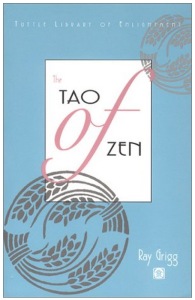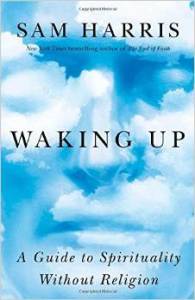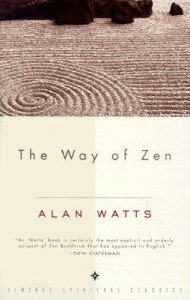“Don’t try to get rid of the ego-sensation. Take it, so long as it lasts, as a feature or play of the total process — like a cloud or wave, or like feeling warm or cold, or anything else that happens of itself. Getting rid of one’s ego is the last resort of invincible egoism! It simply confirms and strengthens the reality of the feeling. But when this feeling of separateness is approached and accepted like any other sensation, it evaporates like the mirage that it is.” — Alan Watts
Tag Archives: Quotable
Shoot all the guys wearing combat pants first
Interesting interview with William Gibson. I guess it’s about style and fashion although I doubt he’d describe it thus. “Tech Wear and the Limits of Authenticity” is a pretty good description.
My rule is that if Dick Cheney couldn’t wear it without creating a stir, I shouldn’t either. I like clothing that isn’t easily noticed. […] I’m embarrassed if I think anyone knows exactly what I paid for something, or even where I got it. I want what I’m wearing to feel good on, wear well, and to be extremely functional.
There’s an idea called “gray man”, in the security business, that I find interesting. They teach people to dress unobtrusively. Chinos instead of combat pants, and if you really need the extra pockets, a better design conceals them. They assume, actually, that the bad guys will shoot all the guys wearing combat pants first, just to be sure. I don’t have that as a concern, but there’s something appealingly “low-drag” about gray man theory: reduced friction with one’s environment.
Idoru
“Laney had recently noticed that the only people who had titles that clearly described their jobs had jobs he wouldn’t have wanted.” — From William Gibson’s 1996 novel, Idoru
How to Be an Expert in a Changing World
“It seems to me that beliefs about the future are so rarely correct that they usually aren’t worth the extra rigidity they impose, and that the best strategy is simply to be aggressively open-minded. Instead of trying to point yourself in the right direction, admit you have no idea what the right direction is, and try instead to be super sensitive to the winds of change.” — Paul Graham
Chris Rock on race and comedy
A long, but interesting, interview with Chris Rock in New York magazine. A few excerpts to wet your whistle:
If poor people knew how rich rich people are, there would be riots in the streets.
When we talk about race relations in America or racial progress, it’s all nonsense. There are no race relations. White people were crazy. Now they’re not as crazy. To say that black people have made progress would be to say they deserve what happened to them before.
There have been smart, educated, beautiful, polite black children for hundreds of years. The advantage that my children have is that my children are encountering the nicest white people that America has ever produced. Let’s hope America keeps producing nicer white people.
Spark
 This was a very satisfying read. The cold, professional killer story has been told so many times it must be difficult to find a fresh take. I liked this one. By John Twelve Hawks.
This was a very satisfying read. The cold, professional killer story has been told so many times it must be difficult to find a fresh take. I liked this one. By John Twelve Hawks.
In reality, the universe is neutral about our existence. Only dogs care.
A Vast Machine watched and evaluated them, remembering their past actions and predicting their future behavior.
All language –everything we say– is just an approximation of reality.
Most conscious thought is simply an attempt to claim ‘authorship’ for a choice that has already been made. Our thoughts are just an ongoing attempt to explain what we’ve already decided.
Lying, not love, is the fundamental indication of humanity.
The laws of mathematics are stronger than the laws of man.
True ideology has vanished, replaced by fear and fantasy. The right wing wants corporate control and a return to a past that never existed. The left wing wants government control and a future that will never exist.
Our problem is not machines acting like humans — it’s humans acting like machines.
What happens in our future can change the meaning of what has happened in our past.
The Tao of Zen
 “The Tao of Zen is a nonfiction book by Ray Grigg. The work argues that what we recognize as traditional Chinese Ch’an/Japanese Zen Buddhism is in fact almost entirely grounded in Chinese Taoist philosophy, though this fact is well shrouded by the persistence of Mahayana Buddhist institutional trappings. Utilizing an array of scholarly commentary on the two traditions and historical deduction from what can be considered to be the best primary source material available, the author traces the development of Taoism and Buddhism in China and Japan for two millennia.” (Wikipedia)
“The Tao of Zen is a nonfiction book by Ray Grigg. The work argues that what we recognize as traditional Chinese Ch’an/Japanese Zen Buddhism is in fact almost entirely grounded in Chinese Taoist philosophy, though this fact is well shrouded by the persistence of Mahayana Buddhist institutional trappings. Utilizing an array of scholarly commentary on the two traditions and historical deduction from what can be considered to be the best primary source material available, the author traces the development of Taoism and Buddhism in China and Japan for two millennia.” (Wikipedia)
I’ve read this book twice and expect to read it again but I wouldn’t know where to begin to describe it. The Wikipedia link above is a good start. As is my habit with nonfiction, I highlighted as I read: The Tao of Zen (Ray Grigg)
Waking Up
 Just finished Waking Up – A Guide to Spirituality Without Religion by Sam Harris. Amazon reviews here; more about Mr. Harris here. Ideas I found highlighter-worthy below.
Just finished Waking Up – A Guide to Spirituality Without Religion by Sam Harris. Amazon reviews here; more about Mr. Harris here. Ideas I found highlighter-worthy below.
Our minds are all we have. They are all we have ever had. And they are all we can offer others. Every experience you have ever had has been shaped by your mind.
It is your mind, rather than circumstances themselves, that determine the quality of your life.
Everything we want to accomplish is something that promises, if done, it would allow us to finally relax and enjoy our lives in the present. […] Each of us is looking for a path back to the present: We are trying to find good enough reasons to be satisfied now.
Twenty percent of Americans describe themselves as “spiritual but not religious.”
Is it possible to be happy before anything happens, before one’s desires are gratified, in spite of life’s difficulties, in the very midst of physical pain, old age, disease, and death?
On one level, wisdom is nothing more profound than an ability to follow one’s own advice.
A true spiritual practitioner is someone who has discovered that it is possible to be at ease in the world for no reason, if only for a few moments at a time.
It is impossible for any faith, no matter how elastic, to fully honor the truth claims of another.
We manage to avoid being happy while struggling to become happy.
(Mindfulness is ) a state of clear, nonjudgmental, and undistracted attention to the contents of consciousness. […] Being mindful is not a matter of thinking more clearly about experience; it is the act of experiencing more clearly, including the arising of thoughts themselves.
The problem is not thoughts themselves but the state of thinking without knowing we are thinking.
Most people who believe they are meditating are merely thinking with their eyes closed.
Most of us spend every waking moment lost in the movie of our lives.
Meditation is a technique for waking up.
Investigating the nature of consciousness is the basis of spiritual life.
Consciousness is the one thing in this universe that cannot be an illusion.
If you shut your eyes at this moment, the contents of your consciousness change quite drastically, but your consciousness (arguably) does not.
Are we unconsciousness during sleep or merely unable to remember what sleep is like?
We are not aware of all the information that influences our thoughts, feelings, and actions.
I’ve forgotten most of what has happened to me over the course of my life.
Subjectively speaking, the only thing that actually exists is consciousness and its contents. […] Reality vastly exceeds our awareness of it.
(I am) a continuum of experience.
The feeling of “I” is a product of thought. […] Having an ego is what it feels like to be thinking without knowing that you are thinking.
(Thoughts are) transient appearances in consciousness.
We tell ourselves the story of the present, as though some blind person were inside our heads who required continuous narration to know what is happening.
Even if your life depended on it, you could not spend a full minute free of thought. […] We spend our lives lost in thought. […] Taking oneself to be the thinking of one’s thoughts is a delusion.
One must be able to pay attention closely enough to glimpse what consciousness is like between thoughts — that is, prior to the arising of the next one.
We imagine that we are conscious of our selves within our bodies. We seem to be riding around inside our bodies.
(The self) is the feeling that there is an inner subject, behind our eyes, thinking our thoughts and experiencing our experience.
It may be that an awareness of other minds is a necessary condition for an awareness of one’s own.
Consciousness is the prior condition of every experience; the self or ego is an illusory appearance within it; look closely for what you are calling “I,” and the feeling of being a separate self will disappear; what remains, as a matter of experience, is a field of consciousness — uncontaminated by its ever-changing contents.
Consciousness is intrinsically free of self.
That which is aware of sadness is not sad. That which is aware of fear is not fearful. Notice thoughts as they emerge and recognize them to be transitory appearances in consciousness. In subjective terms, you are consciousness itself — you are not the next, evanescent image or string of words that appears in your mind.
Consciousness is intrinsically undivided.
Nothing is intrinsically boring — boredom is simply a lack of attention.
We need not come to the end of the path to experience the benefits of walking it.
We read for the pleasure of thinking another person’s thoughts.
It is by ceasing to cling to the contents of consciousness — to our thought, moods, and desires — that we make progress.
There is experience, and then there are the stories we tell about it.
Consciousness is never improved or harmed by what it knows.
The Masked Avengers
“All you need to be a world-class hacker is a computer and a cool pair of sunglasses. And the computer is optional.” — The Masked Avengers: How Anonymous incited online vigilantism from Tunisia to Ferguson.
The Way of Zen by Alan Watts
Excerpts from The Way of Zen
I have no other self than the totality of things of which I am aware.
I have somehow become the empty space in which everything is happening.
TAO
The vague, void-seeming, and indefinable Tao is the intelligence which shapes the world with a skill beyond our understanding. … Whereas God produces the world by making, the Tao produces it by “not-making” (growing).
The Tao’s principle is spontaneity. But spontaneity is not by any means a blind, disorderly urge, a mere power of caprice. … A philosophy restricted to the alternatives of conventional language has no way of conceiving an intelligence which does not work according to plan, according to a (one-at-a-time) order of thought.
Hsuan – A metaphorical darkness; the sheer inconceivability which confronts the mind when it tries to remember a time before birth, or to penetrate its own depths.
If the ordinary man is one who has to walk by lifting his legs with his hands, the Taoist is one who has learned to let the legs walk by themselves.
The eye’s sensitivity to color is impaired by the fixed idea that there are just five true colors.
BUDDHISM
Reasonable men will always be capable of compromise, but men who have dehumanized themselves by becoming the blind worshipers of an idea or an ideal are fanatics whose devotion to abstractions make them enemies of life.
The value of emptiness lies in the the movements it permits or in the substance which it mediates and contains. But the emptiness must come first. This is why Indian philosophy concentrates on negation, on liberating the mind from concepts of Truth.
The basic reality of my life is not any conceivable object.
Maya: Things, facts, and events are delineated, not by nature, but by human description, and the way in which we describe (or divide) them is relative to our varying points of view.
–
The formal world becomes the real world in the moment when it is no longer clutched, in the moment when its changed fluidity is no longer resisted.
It is precisely (the) realization of the total elusiveness of the world which lies at the root of Buddhism.
SELF
Any attempt to conceive the Self, believe in the Self, or seek for the Self immediately thrusts it away.
It is fundamental to every school of Buddhism that there is no ego, no enduring entity which is the constant subject of our changing experiences. For the ego exists in an abstract sense alone, being an abstraction from memory. The past from which our ego is abstracted has entirely disappeared.
To one who has self-knowledge, there is no duality between himself and the external world.
(Zen on the Round of birth-and-death) The process of rebirth is from moment to moment, so that one is being reborn so long as one identifies himself with a continuing ego which reincarnates itself at each moment in time.
Nirvana can only arise unintentionally, spontaneously, when the impossibility of self-grasping has been thoroughly perceived.
Buddhism does not share the Western view that there is a moral law, enjoined by God or nature, which is man’s duty to obey.
Smriti (recollectedness) is a constant awareness or watching of one’s sensations, feelings, and thoughts – without purpose or comment. It is a total clarity and presence of mind, actively passive, wherein events come and go like reflections in a mirror: nothing is reflected except what is.
Through such awareness it is seen that the separation of the thinker from the thought, the knower from the known, the subject from the object, is purely abstract. There is not the mind on the one hand and its experiences on the other: there is just a process of experiencing in which there is nothing to be grasped, as an object, and no one, as a subject, to grasp it.
The object itself is just thought. A thought cannot see itself.
Dharmadhatu – The proper harmony of the universe is realized when each “thing-event” is allowed to be freely and spontaneously itself, without interference.
Logic and meaning, with its inherent duality, is a property of thought and language but not of the actual world.
As the sound “water” is not actually water, the classified world is not the real world.
Instead of trying to purify or empty the mind, one must simply let go of the mind – because the mind is nothing to be grasped. Letting go of the mind is also equivalent to letting go of the series of thoughts and impressions which come and go “in” the mind, neither repressing them, holding them, nor interfering with them.
PRINCIPLES AND PRACTICE
The fondest illusion of the human mind: in the course of time everything may be made better and better.
The power of thought enables us to construct symbols of things apart from the things themselves. This includes the ability to make a symbol, an idea of ourselves apart from ourselves. We learn to identify ourselves with our idea of ourselves.
All ideas of self-improvement and of becoming or getting something in the future relate solely to our abstract image of ourselves.
In Taoist and Buddhist thought there is no conception of a God who deliberately and consciously governs the universe. [The Tao, without doing anything leaves nothing undone]
It is part of the very genius of the human mind that it can, as it were, stand aside from life and reflect upon it, that it can be aware of its own existence, and that it can criticize its own processes.
When human beings think too carefully and minutely about an action to be taken, they cannot make up their minds in time to act.
From (such) memories, reflections, and symbols the mind constructs its idea of itself. … The identification of the mind with its own image is paralyzing because the image is fixed — it is past and finished.
The attempt to act and think about (an) action simultaneously is precisely the identification of the mind with its idea of itself.
Whatever we do, and whatever “happens” to us, is ultimately “right.”
To act “without second thought,” without double-mindedness, is by no means a mere precept of our imitation. For we cannot realize this kind of action until it is clear beyond any shadow of doubt that it is actually impossible to do anything else.
There is no necessity for the mind to try to let go of itself, or to try not to try.
“Brushing off thoughts which arise is just like washing off blood with blood.” – Japanese master Bankei
Social conditioning fosters the identification of the mind with a fixed idea of itself as the means of self-control, and as a result man thinks of himself as “I” – the ego. Thereupon the mental center of gravity shifts from the spontaneous or original mind to the ego image. Once this has happened, the very center of our psychic life is identified with the self-controlling mechanism.
As soon as I recognize that my voluntary and purposeful action happens spontaneously “by itself,” just like breathing, hearing, and feeling, I am no longer caught in the contradiction of trying to be spontaneous. There is no real contradiction, since “trying” is “spontaneity.”
One stops trying to be spontaneous by seeing that it is unnecessary to try, and then and there it can happen. … One does not realize the spontaneous life by depending on the repetition of thoughts or affirmation. One realizes it by seeing that no such devices are necessary.
Zen lies beyond the ethical standpoint, whose sanctions must be found, not in reality itself, but in the mutual agreement of human beings.
Zen does not confuse spirituality with thinking about God while one is peeling potatoes. Zen spirituality is just to peel the potatoes.
Zen is neither self nor Buddha to which one can cling, no good to gain and no evil to be avoided, no thoughts to be eradicated and no mind to be purified, nobody to perish and no soul to be saved.
The practice of Zen is not the true practice so long as it has an end in view, and when it has no end in view it is awakening — the aimless, self-sufficient life of the “eternal now.”
As muddy water is best cleared by leaving it alone, it could be argued that those who sit quietly and do nothing are making one of the best possible contributions to a world in turmoil.
To see the world as it is concretely, undivided by categories and abstractions, one must certainly look at it with a mind which is not thinking — which is to say, forming symbols about it. … A quiet awareness, without comment, of whatever happens to be here and now. This awareness is attended by the most vivid sensation of “nondifference” between oneself and the external world, between the mind and its contents — the various sounds, sights, and other impressions of the surrounding environment. … It just comes by itself when one is sitting and watching without any purpose in mind — even the purpose of getting rid of purpose.
The basic position of Zen is that it has nothing to say, nothing to teach. The truth of Buddhism is so self-evident, so obvious that it is, if anything, concealed by explaining it.
Awakening almost necessarily involves a sense of relief because it brings to an end the habitual psychological cramp of trying to grasp the mind with the mind, which in turn generates the ego with all its conflicts and defenses.
What we are, most substantially and fundamentally, will never be a distinct object of knowledge. Whatever we can know — life and death, light and darkness, solid and empty — will be the relative aspects of something as inconceivable as the color of space.
Awakening is to know what reality is not.
So long as one thinks about listening, one cannot hear clearly, and so long as one thinks about trying or not trying to let go of oneself, one cannot let go. Yet whether one thinks about listening or not, the ears are hearing just the same, and nothing can stop the sound from reaching them.
Because the world is not going anywhere there is no hurry. Hurry, and all that it involves, is fatal. For there is no goal to be attained.
The purposeful life has no content, no point. It hurries on and on, and misses everything. It is only when there is no goal and no rush that the human senses are fully open to receive the world. People in a hurry cannot feel.
Making an effort to concentrate on the instantaneous moment implies at once that there are other moments.

